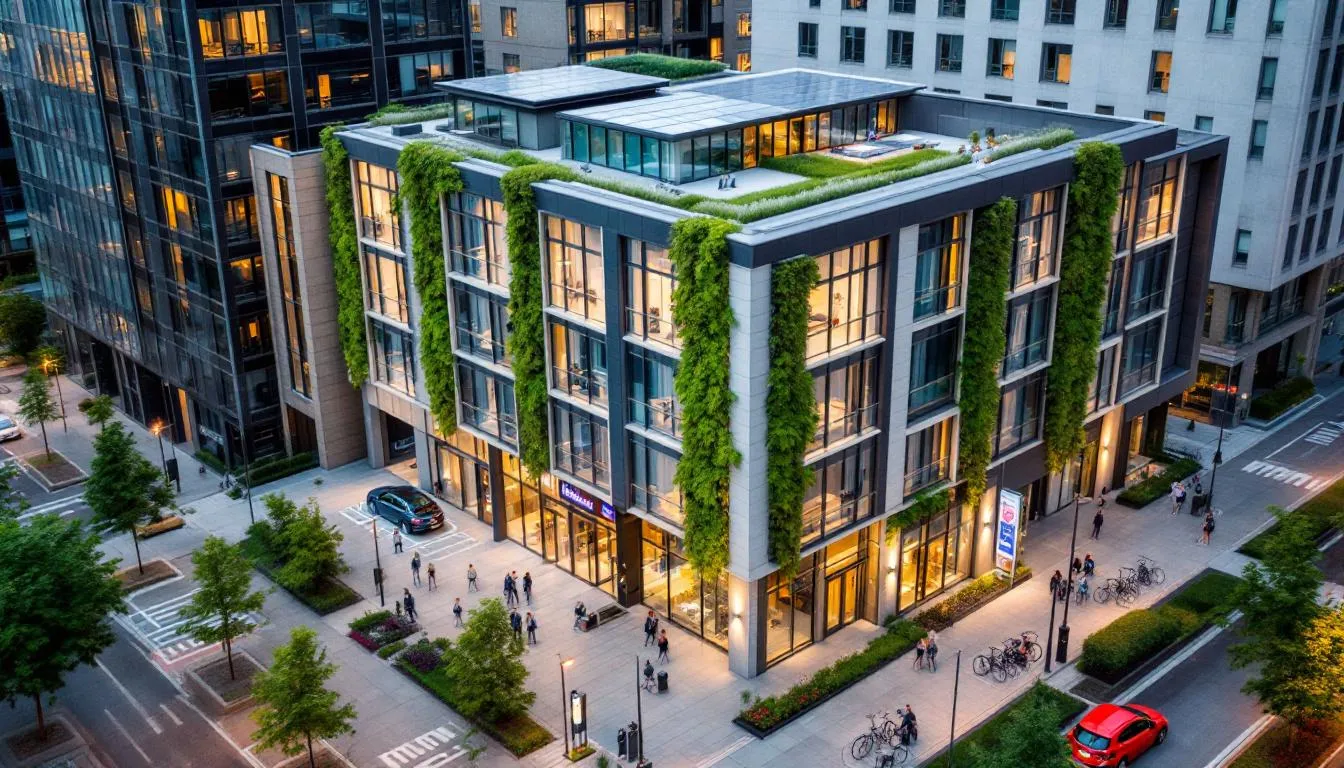Global Hospitality Outlook in 2026 and Beyond
 Mika Takahashi
Mika Takahashi Mika Takahashi
Mika TakahashiThe global hospitality industry has bounced back stronger than ever, not just recovering from the pandemic but reaching new heights that surpass pre-2019 levels. As hospitality leaders steer through this exciting era of expansion, getting a clear grasp on the key trends shaping the sector is essential for long-term success. The hospitality outlook for 2026 paints a picture of an industry transformed by cutting-edge technology, shifting guest preferences, and smart investments that are redefining how hospitality businesses operate and compete.
With the industry hitting an impressive $4.993 trillion market size in 2024, hospitality companies are riding a wave of positive momentum across multiple areas. Yet, this growth brings its own set of challenges that call for thoughtful adaptation. From staffing shortages impacting 68% of hotels to the rapid rise of artificial intelligence in daily operations, hospitality organizations must juggle immediate needs with forward-thinking strategies.
This in-depth look dives into the main forces driving change, offering hospitality leaders practical insights to stay ahead in an increasingly competitive landscape. Whether you’re running hotel companies, restaurant chains, or hospitality groups, understanding these trends is key to maintaining your edge and achieving sustainable growth in 2026 and beyond.
The global hospitality industry has shown remarkable resilience, with 2024 numbers signaling not just a recovery but a real expansion beyond past benchmarks. RevPAR grew by 4% year-over-year, and room demand soared to 4.8 billion room nights, reflecting strong consumer confidence and a renewed appetite for travel.
Hotel occupancy rates worldwide are set to reach 72% in 2026, an impressive 8 percentage points higher than pre-pandemic levels in 2019. This isn’t just a bounce-back; it’s a genuine market expansion. RevPAR has surged 15% to $112.50 in key markets, while international visitor spending jumped 23%, signaling a robust return of global travel patterns.

Looking closer, regional differences offer important insights for hospitality businesses. The Americas and Europe have fully recovered and even surpassed their 2019 occupancy, average daily rate, and revenue figures. Hotels in these regions are enjoying strong year-over-year RevPAR growth, creating a fertile ground for expansion and strategic investments.
Meanwhile, the Asia-Pacific region is still catching up, trailing 2019 volumes due to slower reopenings and lingering travel restrictions. However, industry experts expect APAC to pick up steam as connectivity improves, presenting exciting opportunities for hospitality companies with a long-term vision.
The restaurant industry is also on an upswing, with U.S. restaurant sales projected to climb 4% to $1.1 trillion in 2026. This signals a broad recovery across the hospitality landscape, fueled by evolving consumer habits and increased discretionary spending.
Luxury hospitality is shining particularly bright, with occupancy rates hitting 78%, boosted by a 34% increase in high-net-worth travelers. This segment commands premium pricing and highlights the market’s hunger for elevated guest experiences, making it a prime focus for hospitality groups aiming to boost profitability.
Technology has become the heartbeat of today’s hospitality operations, reshaping how hospitality organizations craft guest experiences and manage behind-the-scenes work. The pace of tech adoption across the sector shows a clear commitment to digital transformation and operational excellence.
AI-powered tools are at the forefront, with 89% of hotels now using AI chatbots. These smart systems have cut guest response times by 73%, making customer service faster and more efficient while helping reduce labor costs. They enable personalized guest experiences on a large scale, letting hotels handle more guests without needing to hire proportionally more staff.
Mobile-first approaches are now the norm for guest interactions. A whopping 94% of travelers prefer mobile check-in and check-out, enjoying the contactless convenience that also speeds up service. This shift helps hospitality businesses streamline operations and meet guest expectations for seamless digital experiences.
Trust in AI-driven personalization is soaring, with nearly half of travelers using AI to plan trips, get tailored offers, and enjoy customized in-stay experiences. This opens doors for hospitality companies to deliver exactly what individual guests want, boosting satisfaction and unlocking new revenue through targeted upselling.
AI booking and front desk assistants are becoming increasingly common across hotels of all sizes, marking the start of a major trend that’s set to grow in the coming years.

Restaurants are also embracing technology, with 87% of full-service establishments using QR code menus. This innovation cuts service times by 14 minutes per table on average, turning tables faster and integrating seamlessly with loyalty and customer relationship systems.
Virtual reality tours and augmented reality apps are gaining ground, especially for pre-stay hotel tours and local recommendations. These immersive tools help potential guests explore properties before booking and encourage upgrades by showcasing room amenities and services.
The Internet of Things (IoT), property management systems, and digital communication platforms are all weaving together to build resilient, tech-savvy hospitality businesses. AI-powered analytics are not just personalizing guest experiences but also optimizing revenue management and dynamic pricing, helping hotels maximize profits in real time.
The growing focus on sustainability and wellness is reshaping the hospitality landscape and opening up huge growth opportunities.
Wellness tourism alone accounts for a staggering $1.2 trillion in global travel spending, making up 18% of all travel expenditures. Travelers today are prioritizing holistic health, preventive care, and active lifestyles during their trips. Hospitality companies that weave wellness programs into their offerings are capturing a larger slice of the market and commanding premium pricing.
Luxury travelers are especially drawn to wellness, with 73% now seeking hotels with certified wellness programs and health-focused amenities. These properties offer everything from in-room fitness gear to advanced spa treatments and nutrition-conscious dining, creating guest experiences that stand out and justify higher rates.
Medical tourism is booming as well, growing at a 15.6% CAGR and attracting 23 million cross-border health travelers in 2025. Hotels offering medical wellness packages enjoy average daily rates 22-35% above conventional properties, showcasing the lucrative potential of this niche.

Environmental sustainability has moved from a “nice-to-have” to an expectation for both guests and investors. An impressive 92% of hotels have switched to LED lighting, saving the industry $1.2 billion annually in energy costs while shrinking their carbon footprints. This widespread adoption shows how eco-friendly practices can benefit both the planet and the bottom line.
Sustainability goes beyond energy savings to include waste reduction initiatives, water conservation, renewable energy, and green building certifications. With 70% of global consumers actively prioritizing sustainable living, hospitality companies face growing pressure to prove their environmental commitment in operations and branding.
Recycling programs, locally sourced food and beverage options, and partnerships with environmental groups are now common among hospitality businesses aiming to attract eco-conscious travelers. These sustainability practices not only meet guest expectations but also deliver meaningful cost savings and operational efficiencies.
Wellness and sustainability combine to create powerful synergies. Properties that offer certified wellness alongside strong environmental practices are capturing the fastest-growing travel segments and building lasting competitive advantages.
Staffing remains one of the hospitality industry’s biggest challenges in 2025. With 68% of hotels struggling to fill roles, workforce management has become a top strategic priority that directly affects service quality and operational success.
Shortages hit hardest in housekeeping (42% vacancies) and culinary roles (39%), creating bottlenecks that can hurt guest satisfaction and performance. Managing talent effectively is crucial to staying competitive.
The U.S. hospitality sector employs around 17 million people but faces retention challenges due to rising labor costs, competition from other industries, and changing employee expectations. The rise of remote work in other sectors has given workers more options, including flexible arrangements that hospitality often can’t match.
AI-powered talent management platforms are emerging as valuable tools. They improve hiring by matching candidates to roles that fit their skills and preferences, simplify onboarding, and boost engagement with personalized career development.
The industry is shifting away from rigid hierarchies toward agile, collaborative teams. This cultural change helps attract younger workers and keeps organizations flexible amid evolving guest demands and operational needs. Hospitality leaders find that flatter structures improve employee wellness and job satisfaction.
Diversity, equity, and inclusion (DEI) efforts are becoming central to workforce health. Leading groups invest in mentorship, transparent career paths, and inclusive cultures. These initiatives boost staff retention and meet the expectations of diverse guests who want to see their values reflected in the companies they support.
Guest-facing roles like concierge services are evolving to attract and retain talent by incorporating tech skills and cross-training, making jobs more engaging and offering career growth.
Employee wellness programs now include mental health support, flexible schedules, and professional development, all vital for competing in today’s tight labor market.
Travel habits are changing in fundamental ways, and hospitality businesses need to adapt to meet guests’ evolving expectations.
Bleisure travel — mixing business and leisure — is booming, with 58% of business travelers extending trips for leisure or bringing family. Fueled by remote and hybrid work, this trend changes booking patterns and demands new amenities. Hotels are responding by creating spaces that support both productivity and relaxation.
Personalized experiences are more in demand than ever, with half of travelers seeking custom activities and interactions. These guests are willing to pay extra for unique, tailored offerings rather than cookie-cutter packages. This opens doors for hospitality companies to craft meaningful, differentiated services that boost satisfaction and revenue.

Generation Alpha, the tech-savvy kids born after 2010, are already influencing family travel decisions. Their love of technology and instant gratification is pushing hospitality companies to rethink youth and family engagement with more interactive, tech-forward amenities.
Solo travel is another fast-growing segment, with travelers seeking transformative experiences like cultural immersion, adventure, and wellness retreats. These guests prioritize authentic, meaningful experiences over material luxuries.
The trend toward meaningful experiences over possessions is reshaping marketing and operations across the sector. Properties are investing in local partnerships and authentic cultural programming to meet these changing guest preferences.
Remote workers are creating demand for extended stays with strong Wi-Fi, dedicated workspaces, and business-friendly amenities. This is driving innovation in room design and common areas that blend comfort with productivity.
Travelers increasingly want easy access to new destinations and genuine local experiences, encouraging hospitality companies to strengthen community ties and offer locally rooted programming — a win-win for guest satisfaction and local impact.
Despite economic uncertainties, the hospitality real estate investment scene looks promising. Global hotel investment volumes are expected to grow 15-25% in 2025, reflecting renewed confidence and strong recovery metrics.
Urban hubs like London, New York, and Tokyo are drawing the most investor interest thanks to their stability and long-term yield potential. These cities benefit from steady demand, diverse guests, and solid infrastructure supporting sustainable growth.
Medical wellness real estate and integrated resorts are especially attractive, commanding daily rates 22-35% above traditional hospitality properties. These niche markets appeal to investors chasing premium returns while meeting rising demand for health-focused travel.

Higher interest rates and capital costs are shaping market dynamics, favoring well-capitalized, long-term investors. While some buyers face fewer deals due to financing challenges, those with strong balance sheets find attractive opportunities at better valuations than in the past decade’s low-rate environment.
Hotels continue to outperform commercial office real estate for investors, thanks to steady travel demand, favorable supply-demand balance, and better risk-adjusted returns. The sector’s resilience and recovery make it a compelling alternative amid challenges in other real estate markets.
Private equity and institutional investors focus on properties with proven sustainability and tech integration, viewing these factors as crucial for long-term competitiveness and risk management. These criteria increasingly influence investment decisions and valuations.
The market favors hospitality businesses with flexible models and multiple revenue streams. Properties that serve diverse guest segments and adapt quickly to market shifts command premium valuations and investor interest.
Consolidation is another trend, as larger hospitality groups expand portfolios through strategic acquisitions, creating growth capital for some and exit opportunities for others.
Food and beverage (F&B) operations are rapidly evolving due to changing tastes, tech advances, and sustainability concerns. These shifts present both challenges and exciting opportunities for hospitality businesses to boost F&B revenues.
Consumers crave new and diverse flavors, with 75% actively seeking culinary variety and authentic tastes. This drives hospitality companies to team up with local producers, celebrity chefs, and cultural artisans to craft distinctive dining experiences that set them apart.
Sustainability is reshaping menus and sourcing, with 85% of consumers looking for sustainable food and drink options. Climate concerns and supply chain transparency are pushing businesses to overhaul offerings and communicate their environmental commitments clearly.
Demand for plant-based, vegan, and locally sourced ingredients is surging across all segments. Partnering with local farms cuts transport costs and appeals to eco-conscious diners, turning sourcing into a marketing edge.
Bar scenes are changing too, with rising interest in ready-to-drink cocktails, non-alcoholic spirits, and premium craft and celebrity-endorsed beverages. Social media and influencer marketing play big roles in shaping trends and brand loyalty, offering new marketing and engagement avenues.
Though total hotel F&B revenue has dipped relative to room revenue post-pandemic, properties are innovating with experiential dining like chef’s tables, immersive tastings, and multisensory menus that command higher prices.
Technology plays a growing role beyond QR menus, including mobile ordering, AI inventory management, and automated kitchens. These tools reduce labor costs while enhancing consistency and speed, meeting both operational and guest satisfaction goals.
Integrating loyalty programs with F&B lets properties use data analytics to personalize marketing. By understanding guest dining habits, hotels can craft targeted offers and menu suggestions that boost spending and satisfaction.
Looking ahead, the hospitality outlook for 2025 and beyond is one of steady growth mixed with evolving operational challenges. Experts forecast 3-5% annual RevPAR growth, driven by rebounds in group travel, corporate segments, and international travel normalizing to pre-pandemic patterns.
The long-term employment outlook is bright, with travel and hospitality expected to contribute up to 25% of global job growth over the next decade or two. This underscores the sector’s economic importance and the need for strong talent development and organizational agility.
Hospitality leaders stress balancing short-term execution with long-term strategy. Using test-and-learn methods—piloting new products, services, or tech in controlled settings before full rollout—helps manage risks and speed innovation, which is vital given fast-changing tech and guest tastes.
The idea of harvesting low hanging fruit while building future capabilities is a guiding strategy. It means optimizing current operations and revenues while investing in tech, sustainability, and workforce growth to prepare for what’s next.
Staying competitive means adapting continuously to changing consumer demands, regulations, and technology. Successful companies are agile, maintaining high service and operational standards even as markets shift.
Competition for market share will heat up in the second half of the decade. Properties and groups that blend tech innovation, sustainability, and outstanding guest experiences will capture the lion’s share of growth and profits.
Environmental and social responsibility are no longer extras—they’re essential. Hospitality companies must show genuine commitment to sustainability and social impact to attract guests and investors in today’s market.
The ongoing integration of AI, IoT, and data analytics will keep reshaping operations and guest experiences. Companies that use these tools well, while preserving the human touch that creates memorable moments, will lead the pack. AI booking assistants, AI front desk assistants, AI hotel website chat bots and delivery robots are already making waves in hotels worldwide.
Strategic partnerships and ecosystem thinking are becoming must-haves. Collaborations with tech providers, local businesses, wellness experts, and cultural organizations help properties offer a full range of room amenities and services that would be tough to develop alone.
The hospitality outlook for 2025 shines with growth and opportunity, but also calls for smart, proactive adaptation. With the global hospitality industry nearing $5 trillion and showing strong momentum, leaders face both optimism and the need for precise strategy.
Success will come from blending AI-driven personalization, sustainable practices, and authentic guest experiences while tackling workforce challenges. Hospitality businesses must balance day-to-day excellence with a clear long-term vision, addressing staffing shortages, wellness tourism, environmental sustainability, and evolving traveler expectations.
As new hospitality trends emerge and guest preferences evolve, the winners will be those who continuously adapt—combining innovation with flawless execution, technology with genuine human connection—to thrive well into the future.